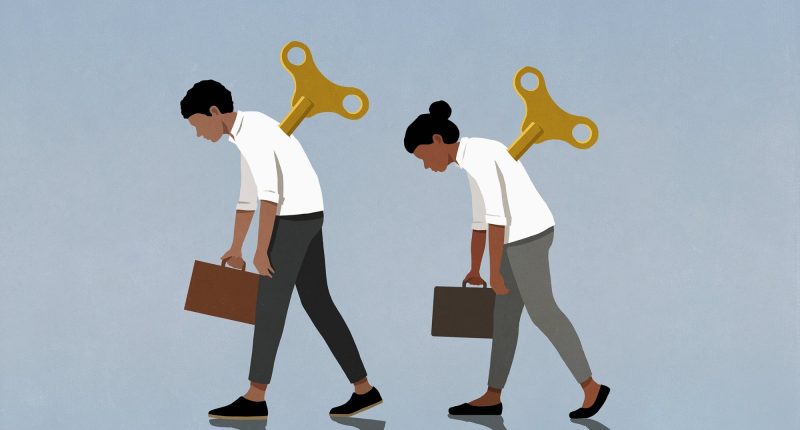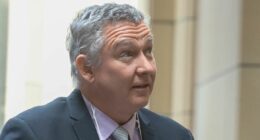Share this @internewscast.com
Opinions expressed by Entrepreneur contributors are their own.
Having spent over two decades working with some of the largest organizations globally, especially in the tech sector, I’ve noticed a concerning trend: the glorification of burnout under the label of “hustle culture.” Extended hours, missed vacations, and constant activity have become symbols of pride for driven professionals. However, here’s the reality: Hustle culture deceives you. If left unchecked, it won’t just impact your health; it can derail your business.
Initially, this relentless drive seems effective. Over a century ago, psychologists Yerkes and Dodson demonstrated that performance increases with moderate stress, a concept now known as the Yerkes-Dodson Curve. However, they also revealed that surpassing a certain threshold of stress results in significant drops in productivity and performance.
Nowadays, numerous entrepreneurs and leaders misinterpret constant pressure as high performance, equating burnout with dedication. Yet, this perspective overlooks a crucial truth: Chronic stress isn’t just mentally exhausting; it physiologically changes the brain.
When we’re constantly overwhelmed, the brain’s capacity for attention and memory — the very building blocks of leadership — deteriorate. And attention, as I often say, is the currency of leadership. Without it, clarity vanishes. Decision-making suffers. Innovation slows. Teams falter.
The damage doesn’t stop at the office door. Chronic stress disrupts sleep, inflames anxiety and chips away at physical health, raising the risk of cardiovascular disease, metabolic disorders and immune dysfunction. What once looked like “grinding toward greatness” starts to look more like grinding yourself down.
A common fear among high performers is: If I eliminate stress, will I lose my edge?
The answer is: Absolutely not.
You don’t sharpen your edge by exhausting yourself. You sharpen it by cultivating resilience, clarity and calm. You can be both dynamic and centered. Fast-moving and grounded. The best leaders I’ve worked with aren’t wired on stress — they’re powered by clarity.
And that clarity is not an accident. It’s practiced.
If you’re finding it hard to break the hustle culture mindset, start small, but with serious intention and, if necessary, forced repetition. Here are three concrete steps you can take to get off the path to burnout:
1. Set a daily calendar reminder to intentionally pause
Truly block off (and don’t move) this “white space” into your schedule and protect it fiercely. I’ve found some very powerful 5-10 minute guided meditations and breathwork routines on Art of Living’s Sattva app that help hit the reset button on an otherwise busy day. Even if you only have 5-10 minutes, you’ll give your nervous system a chance to recoup from a constant “go-mode” that can deplete your mental and physical strength.
2. Redefine “success” with a new personal KPI each month
Hustle culture trains our brains to chase external wins, but you can rewire that reward loop by creating your own, more meaningful metrics. Choose monthly goals that nurture your mental health and sense of presence. That might mean meditating daily for 30 days, exploring a new local park, taking a full lunch break to connect with a friend or finally planning that unplugged vacation. The key is choosing goals that refill your energy, not drain it.
3. Find a way to incorporate nervous system rehab into your corporate culture
Breathwork and simple movement breaks like a quick stretch away from your desk are free, scalable tools you can implement individually or in group settings at an office. Many high-performance teams I’ve worked with have integrated 5-minute breathing resets into their Monday meetings and have seen measurable boosts in focus and team morale.
Tools like breathwork and meditation aren’t “soft skills” or indulgent time-outs. They are scientifically validated ways to reset the nervous system, quiet the noise and tap into a deeper reservoir of energy and insight. A few minutes of conscious breathing can reduce stress, recalibrate your focus and unlock better decisions.
This is the foundation of Transformational Leadership, an approach that strengthens both performance and well-being. It’s not about rejecting hard work. It’s about pairing it with smart recovery. Structured pauses. Deep work instead of performative busyness. Cultures that support reflection as much as action — in other words, working smart.
Because here’s the truth: You can win in business and still lose where it matters most — your peace of mind, your health, your relationships. I’ve seen this firsthand in my work with Fortune 500 leaders who checked every external box of success yet felt anxious, restless and disconnected.
Only when they turned inward through conscious breathing and introspective practices did they rediscover a more enduring form of success. Not just a sharper mind, but a steadier heart. Not just peak performance, but sustainable energy. Many told me it was like finding a new fuel source: one that doesn’t burn out.
And we’re already seeing this shift take hold. A new generation of leaders is prioritizing well-being as a strategic imperative, recognizing that thriving businesses are built by thriving people.
The future of leadership isn’t about who hustles harder. It’s about who leads smarter — with clarity, compassion and inner strength. In a world addicted to speed, stillness may just be your greatest advantage.
Over two decades of working with some of the world’s largest organizations — particularly in tech — I’ve seen a troubling pattern emerge: the glorification of burnout under the banner of “hustle culture.” Long hours. Skipped vacations. Constant motion. These have become badges of honor for ambitious professionals. But here’s the hard truth: Hustle culture is lying to you. Left unchecked, it won’t just cost you your health — it can sabotage your business.
At first, this relentless drive appears effective. Over 100 years ago, psychologists Yerkes and Dodson illustrated that performance improves with moderate stress. This is now known as the Yerkes-Dodson Curve. But they also showed that beyond a certain threshold, stress leads to sharp declines in productivity and performance.
Today, many entrepreneurs and leaders mistake constant pressure for high performance. They confuse burnout with dedication. But this mindset ignores a critical fact: Chronic stress isn’t just mentally draining — it physiologically alters the brain.
The rest of this article is locked.
Join Entrepreneur+ today for access.








